A Decade of Innovation and Partnership
The Jobs Fund is celebrating 10 years of innovation and partnership. We continue to be inspired by a compelling vision to unlock job creation and contribute to more
inclusive economic growth in South Africa. The Fund works toward this vision by seeking partnerships with organisations that offer pragmatic, cutting-edge solutions to
the country's unemployment challenge. Our collaborative effort with our partners is encapsulated in our familiar tagline, "South Africa, Siyasebenza".
On the occasion of our 10th anniversary, the Fund seeks to pause and reflect on the past decade's work. As we commemorate this milestone, we look to celebrate our
enduring partnerships, the capability we have built together and the impactful work that has resulted in meaningful change in the lives of the unemployed.
We, therefore, invite you, over the next few months, to join us in our efforts to give back, to share what we have learned as we collaborate to build a better South Africa.
While the Jobs Fund does not have all the answers on how to solve our unemployment crisis, we know that effective solutions will be realised through partnership, collaboration,
innovation, and risk-sharing. In this, the Jobs Fund can offer a model that works.
As we re-affirm our commitment to light the way for change, may our collective dream of equal opportunity for all South Africans continue to be the driving force that unites
all our efforts to Build Back Better, "Sisebenzela ushintsho oluqhakazile".
The Jobs Fund Journey
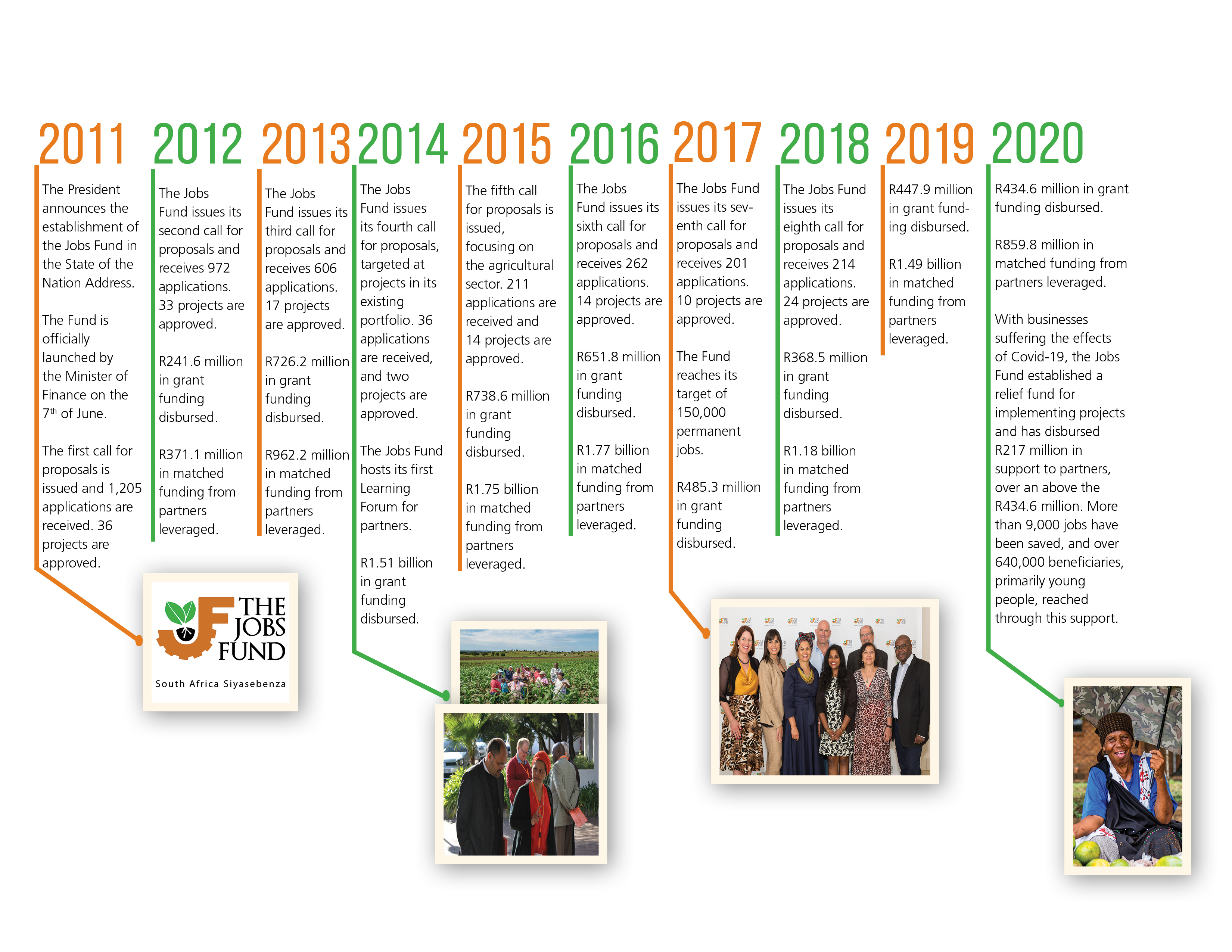
10 Years of Real Impact
Growing Businesses in Under-served Areas.

Spatial inequality in South Africa has negative affected SMMEs residing in peripheral areas, where lack of infractruture, services, supply and markets
has hindered growth. One of the pathways for reducing this gap is forming collaborative partnerships with big and small business, leveraging each other's
resources and capabilities. The development of suitable infractruture to encourage these partnerships is also critical. In response to these needs, Century Property Developments
and Jobs Funds partnered to fund the development of the Riversands Incubation Hub in Diepsloot.
The Project has resulted in the establishment of a vibrant precin that houses both big and small businesses and an advanced incubation hub that will continue
to serve the Diepsloot community into the future. Small businesses are accomodated at the hub for up to three years in subsidided premises with access to business support services,
mentorship and training.
"Our vision as M-Squared Medical specilists in Africa. Also, the most cost-effective medica; equipment supplier in the SADC region."-
Masego Mohajane, Riversands beneficiary
Building a Pipeline of Scarce Skills for Manufacturing.
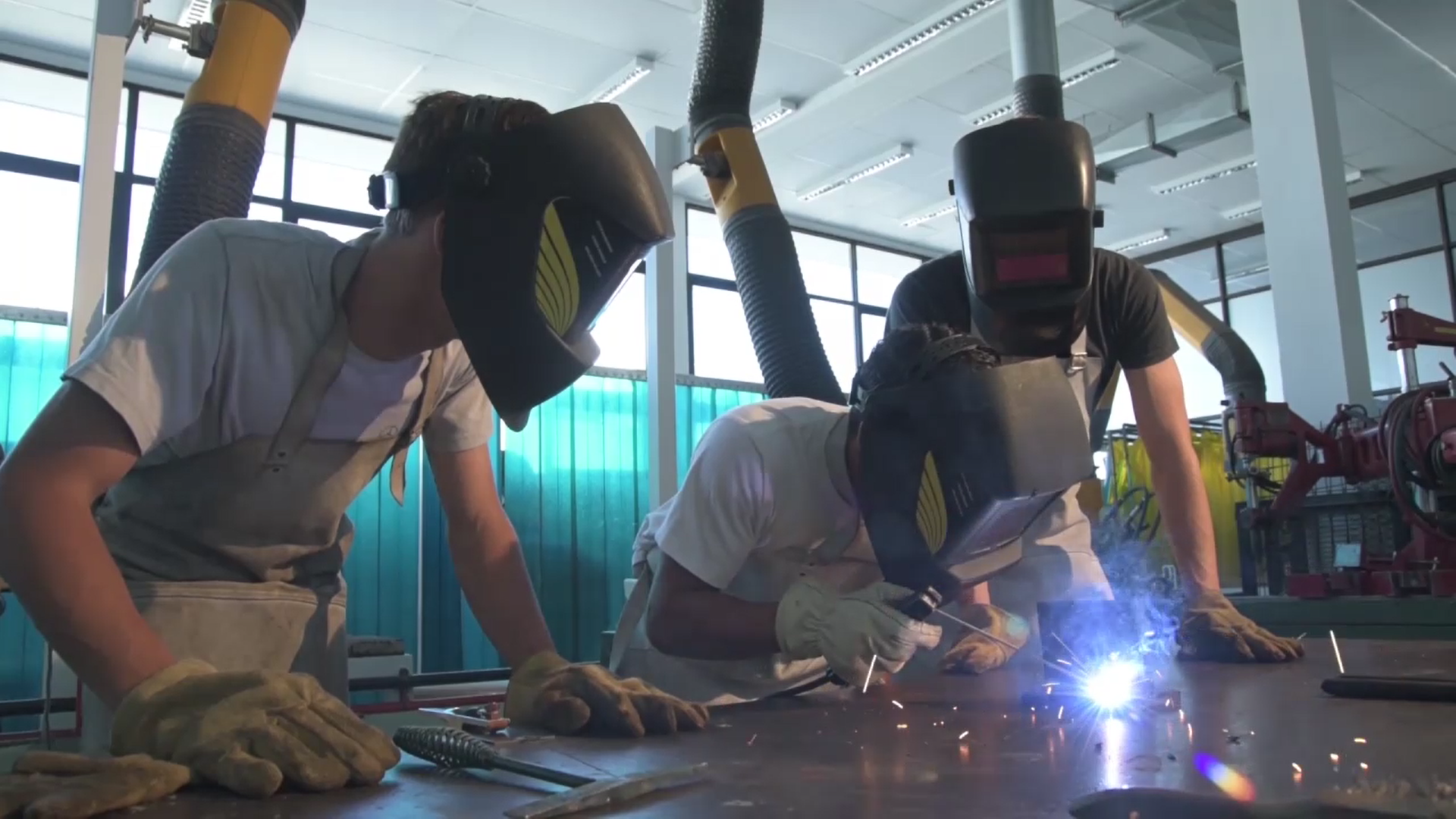
South Africa has a skill shortage in artisans required to fill advanced technical positions relevant to the manufacturing sector.
The local training institutions were largely not equipped to address the skills needed or did not have the latest technology relebvant to
the manufacturing industry. In response, Mercedes-Benz South Africa (MBSA), academy in East London equipped with state-of-the-art technology
required to produce the skilled labour demanded. Technical experts mentor the learners who are trained as milwrights, fitters and electricians
and go to secure positions either within Mercedes-Benz or partner enterprises. The academy provided the skills necessary for the R10 billion investment
to expand MBSA's East London plant in 2018. More young workseekers will benefit from this training academy in years to come, and the demand for skilled artisans
will be met locally.
"We've been on tis journey with the Jobs Fund. The Jobs Fund has helped to co-fund the facility and in return for that we are creating jobs...
They want to ensure that there's sustainability and this is by no means a three-year project, this is a legacy that's going to last a lifetime."
- Stephen Goold. Mercedes-Benz Learning Academy
Creating Micro Jobs for Rural Women.
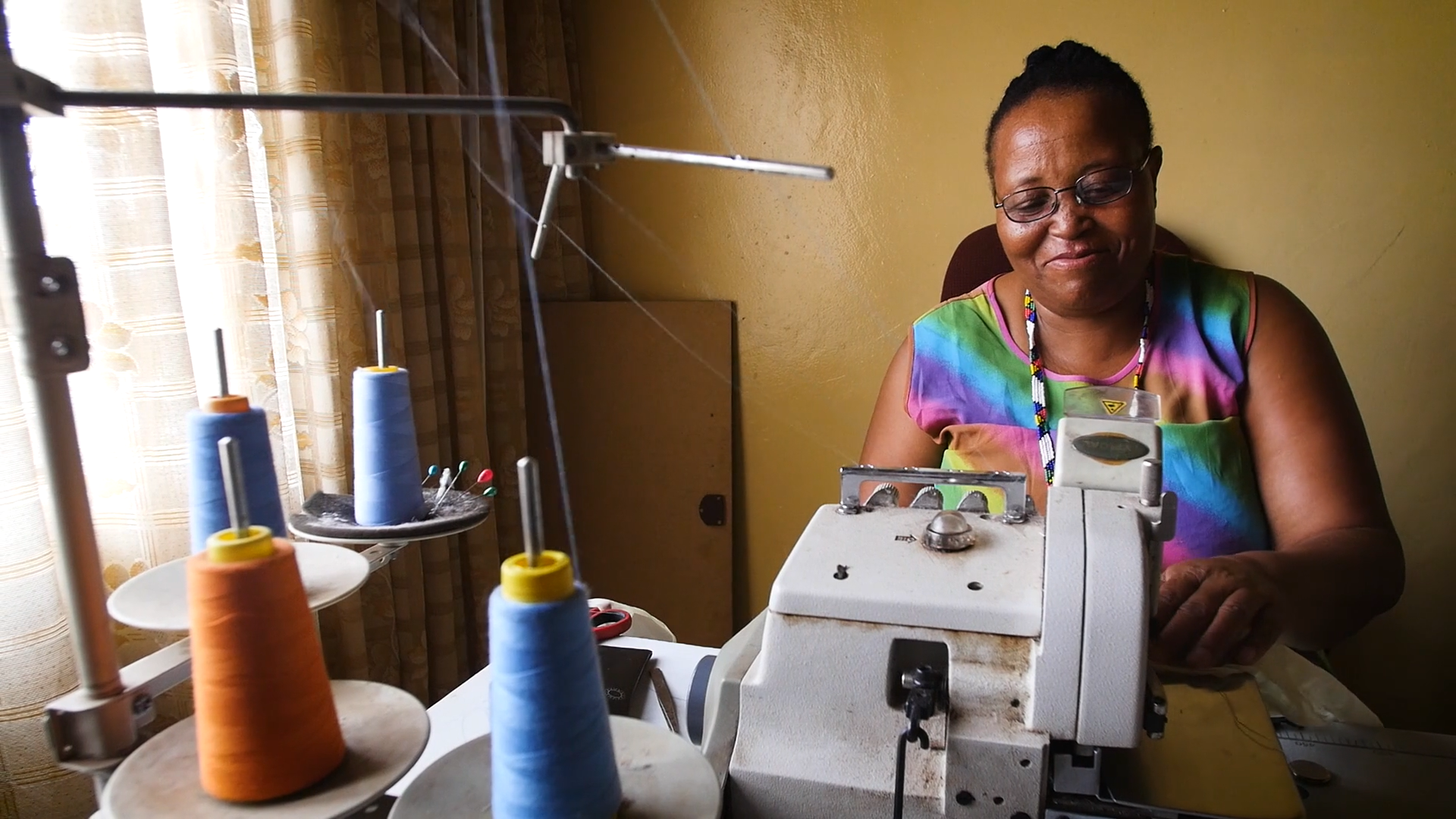
Rural women, who constitute one-fourth of the world’s population, continue to face more barriers/challenges than men in accessing public services,
social protection, employment and markets due to cultural norms and security issues. In South Africa, especially in rural and peri-urban centres,
there is little support for micro-entrepreneurs. The Phakamani Foundation fosters an entrepreneurial spirit while empowering women to earn an income
and improve their living conditions. This is done through basic financial/business training, short-term loans ranging from R1,000 to R30,000, and a
critical group support network. Maggie Mnisi runs a micro-business, offering seamstress services in her community. She is one of the many women who have
received support and funding to grow her operation through the Jobs Fund Phakamani initiative: “I would still be struggling, so I thank Phakamani for coming
into my life and changing it drastically. Because my boys are now educated, they live well and are working.”
– Maggie Mnisi, Phakamani beneficiary.
Developing Entrepreneurs and Affordable Housing.

The Trust for Urban Housing Finance (TUHF) is a specialised financial services company that operates in the niche market of inner-city and township
housing rejuvenation. The Jobs Fund and TUHF partnered to implement initiatives to finance new and existing entrepreneurs, especially previously
disadvantaged individuals, to purchase and construct about 200 residential buildings. TUHF’s offering is geared towards financing the purchase,
construction and management of affordable housing by private entrepreneurs in areas marred by urban decline. Entrepreneurs are screened based on their
ability to repay loans, and a combination of individual capabilities and asset yields is used to determine creditworthiness. SMEs that access financing
from TUHF also participate in capability-building initiatives such as training, mentorship and business support. TUHF has instituted these measures to
manage investment risk downwards (reduces default risk and builds a sustainable funding model).
To open up funding opportunities for those who would not have ordinarily qualified for traditional funding, TUHF has developed a unique funding model to
de-risk investment into these small businesses: “We’ve really tried to innovate funding mechanisms using Jobs Fund money and also trying to get direct access
to the capital markets through listed instruments on the Johannesburg Stock Exchange.” – Paul Jackson, TUHF
Khosi Makolota is one of the many entrepreneurs assisted by TUHF’s uMaStandi initiative, securing both a loan and access to mentorship, which resulted in her
completing a 14-unit housing development in Soweto. Khosi will also be working with uMaStandi to develop her second site to house a further 14 units.
“I’ll be taking all the lessons I learned through this (first) project over to that site,” she says.
Supporting the Growth of Smallholder Farmers.
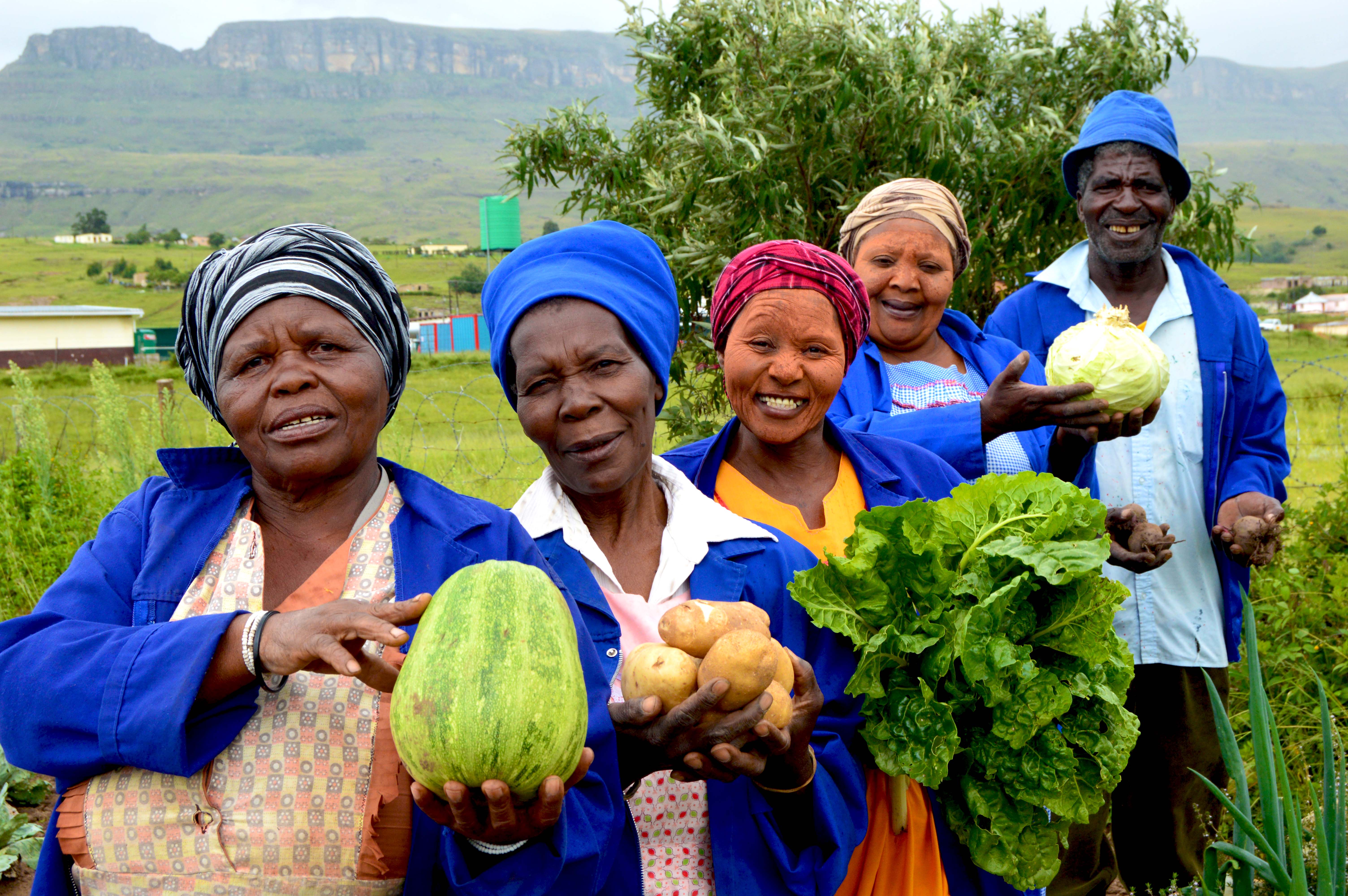
Smallholder farmers are generally resource-poor and unable to afford modern inputs, with production largely limited to ‘traditional’ methods of
agriculture. The Jobs Fund LIMA Smallholder Farmer Support Programme was developed to increase and improve smallholder production, create jobs,
and build relationships between farmers, markets and service providers. Farmers are treated as individual entrepreneurs, and the objective is a
tailored support package that will strengthen their farming operation and ultimately improve profits. Specific focus is placed on empowering women
and attracting youth into the sector. “The Lima-Jobs Fund partnership has had an immense and positive impact on smallholder production and job creation
across South Africa. The grant funding from the Jobs Fund has enabled Lima to extend, sustain and intensify much needed agricultural support provided
through our Farmer Support Programme and has also assisted us in leveraging in additional partners and funders to support the project.” – Lima.
The leverage of this additional funding and support for LIMA has resulted in significantly more beneficiaries being reached, with over 14,000 jobs created
to date. Considering the extent of poverty within rural areas, these jobs represent a lifeline for the beneficiaries and their households.
Growing the Craft and Design Sector through SMME Support.

The craft and design sector was previously dominated by a welfare and poverty alleviation approach, which did not focus on the sustainability
of initiatives or nurture and develop talent and creativity. Craft producers and designers were not formally represented in the market, and
local products were generally not correctly valued. The Craft Design Institute was founded to develop the creative and craft enterprises within
South Africa and link them with both local and international markets. The Jobs Fund and CDI have been partners since 2012, assisting many designers
and crafters in growing their operations and employing more people. The support provided by the initiative includes improving production processes
and facilities; certification and quality assurance of products particularly for export markets; and design support. The project's biggest success
was the market support provided to entrepreneurs, with a number of them indicating that this facilitated their entry into exports markets.
In 2009, Majda Rabin started her fashion design studio, Chimpel, inspired to create affordable quality products made from African sourced leather.
Growth in her business was dependent on securing additional equipment for manufacturing and securing markets: “The Jobs Fund actually assisted me with buying
some of my equipment that I needed. In terms of my marketing as well, the website that I currently have I used part of the funding for that also and my staff
that I have, they’ve got permanent jobs because of the Jobs Fund.” Madja Rabin, CDI beneficiary.
Partner Showcase Corner
Unlocking BPO Jobs for Township Youth.

The Jobs Fund and CCI Group have a shared vision of sustainable job creation in South Africa. Whilst few would argue that creating countless skilled jobs is critical for our country, delivering on this goal is no easy challenge.
When CCI, South Africa’s largest international contact centre, launched CareerBox in 2012, few would have believed that it would be possible to create large numbers of long-term jobs for previously disadvantaged, unemployed and inexperienced youth and women.
An innovative partnership with the Jobs Funds exceeded its ambitious job creation targets and established Durban as a globally competitive BPO (Business Process Outsourcing)/Contact Centre destination.
The CCI Group had a vision to develop Durban (and eventually South Africa as a whole) into a leading player in the international contact centre industry. Contact centres are a growth industry and can potentially create large numbers of high-quality jobs and global investment. The challenge for the CCI Group was a shortage of skilled employees.
This presented a significant risk to their continued business growth.
Read more
Changing Lives One Job at a Time.

The Jobs Fund has been at the forefront of supporting initiatives that provide a link for marginalised youth to access new economic opportunities.
This support is about finding the most innovative approach to help young people find employment and be economically active. In 2019, the Fund approved grant funding for the CCI Group to establish a CareerBox Workforce Development Centre in Umlazi at the Umlazi Mega City complex.
CCI is a leading BPO/Contact Centre in South Africa, serving both the local South African and international markets across various industries.
The partnership aims to recruit local youth and place them into call centres within the CCI Group and its partners.
Various studies have shown that programmes that offer career matching have the most significant impact on employment success. This is because the training is demand-led, i.e., the skills that employers need and because young people are offered real work experience.
The sector continues to be flexible in opening opportunities for candidates who have limited skills or have never worked before. The stories of Moneece and Nomkhosi highlight the impact made by CCI in this space.
Read more
Broadening Access to Early Learning Development for Poor Communities.
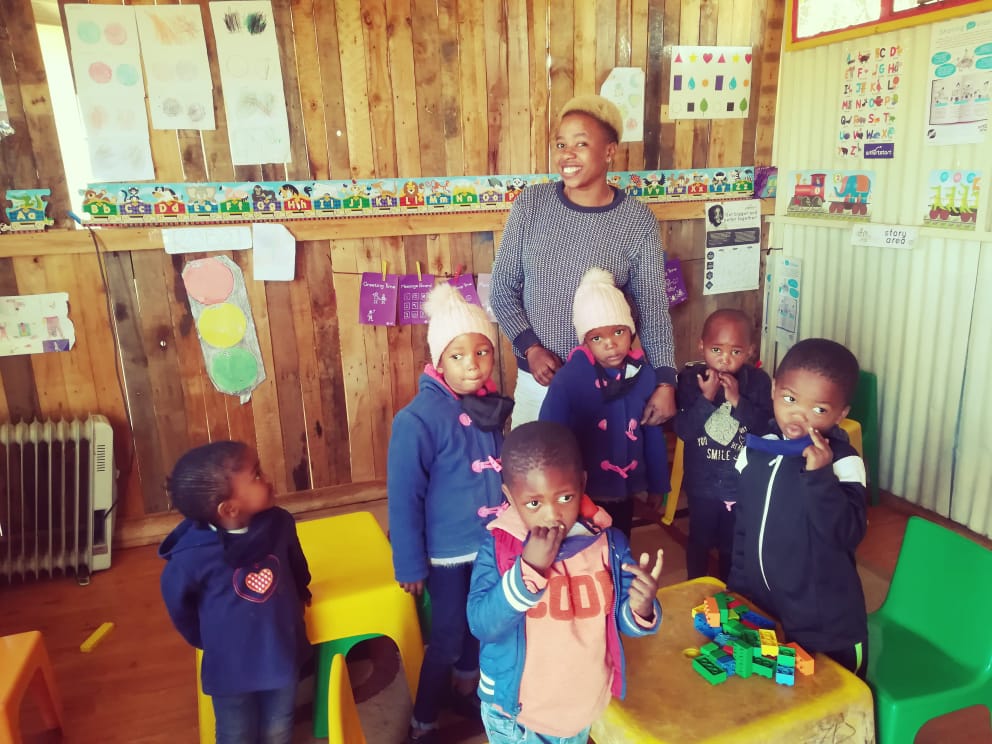
Nosenzo Dladla is a 26-year-old women and sole provider for her family of five, including her two children and siblings. Her parents’ passing required her to fill their role in taking care of the family as no one else in the household was employed.
She joined SmartStart as a franchisee in 2019 and is one of the beneficiaries of the Jobs Fund-SmartStart Early Learning Franchisee Development project, which is a partnership between SmartStart and the Jobs Fund.
The National Treasury Jobs Fund-Smart Start project was approved in 2019 to broaden access to early learning for children in poor communities and create self-employment opportunities for women and youth in peri-urban and rural areas by
establishing social micro-enterprises.
It provides training and business development support through coaches and club networks to enable beneficiaries to operate licensed early learning centres.
Read more
New Economic Spaces for Job Creation in Diepsloot.

Riversands Incubation Hub was established to stimulate local and inclusive economic development and job creation within the Diepsloot and surrounding areas by facilitating access to world-class physical infrastructure and business incubation support.
The development is situated in Johannesburg, adjacent to luxury residential estate Steyn City with four-car garage homes and a stone's throw from the marginalised township of Diepsloot, lies Riversands Incubation Hub. The comparison is stark.
Inequality and high unemployment are pressing issues in South Africa, and Diepsloot reflects what is happening in the country. In most cases, employed residents spend an average of 40% of their salary on transport costs making job retention low.
Businesses have always been located in different areas because of associated expenses like rent and infrastructure.
This prevents integration and the ability of small, medium and micro enterprises (SMMEs) and established businesses to leverage each other's resources and capabilities.
The primary barrier to large-scale industry using SMMEs is quality, security of supply, compliance with quality standards and cost. These challenges can be linked to apartheid spatial planning, which created profound structural infrastructure disadvantages for townships.
In Diepsloot and the surrounding area, the road widths, power availability and size of stands limits the scale of manufacturing, entrepreneurship and economic development in general.
Read more
Get to Know the Jobs Fund
Get to Know the Jobs Fund 1 - Challenge Funding A Tool for Positive Social Impact
Get to Know the Jobs Fund 2 - Encouraging Collaboration
Get to Know the Jobs Fund 3 - Funding Rounds: Evolving from the General to the Specific
Get to Know the Jobs Fund 4 - Support for Workseekers Funding Window
|